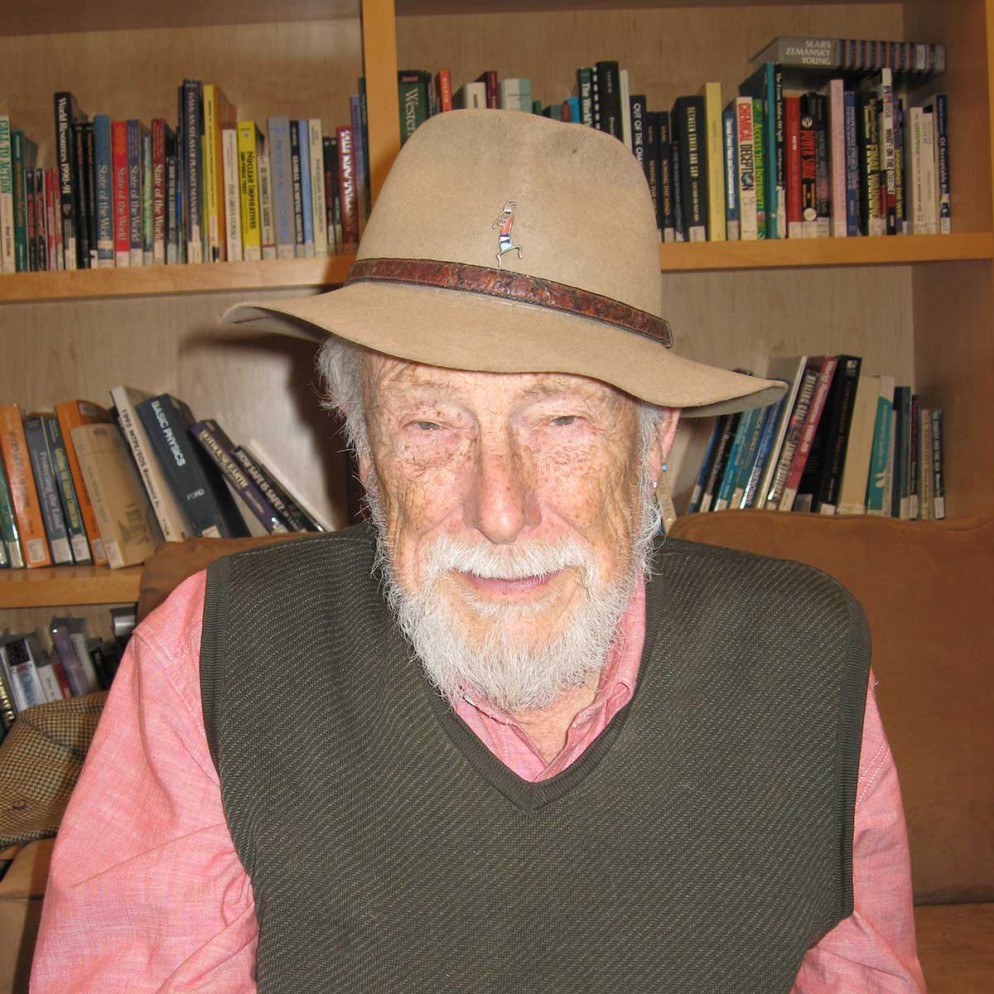Renowned poet and prose writer, environmentalist, Zen Buddhist, and educator Gary Snyder presented the 2015 Daniel Patrick O’Connor Lecture at Colorado College April 22. Prior to the lecture, Snyder spoke with Advancement Web Writer Brenda Gillen in the Tutt Science ERC, where he had just finished a discussion with students.
COLORADO COLLEGE
Gary, in your interview published in Naropa University’s Not Enough Night in 2012, you used a couple of prior interviews as touchstones. I thought we could do that today with the Colorado College interview. You talked about how your writing practice involves availability and how meditation had helped you recognize that. You said: “I am aware that I should stop doing whatever I am doing when something like a poem begins to sneak up on me.” Is that still true for you now? And if it is, could you talk about your meditation practice and how it helps you to feel that poem tugging on your sleeve?
GARY SNYDER
It isn’t only meditating practice that makes that happen. Any kind of relaxed physical outdoor work or even indoor work at the kitchen, at cooking and so forth, opens your mind to other thoughts and other, if I may say so, voices coming in. In fact, I’m very careful with meditation in that I do not believe that meditation should be used for creative purposes. That’s what all my teachers in Japan said. Artists and poets should not use meditation just for their work. It is for your deeper self that you do this. And do not confuse them.
CC
You probably know that Colorado College students follow the Block Plan, where they take just one class at a time for 3-1/2 weeks. What do you think about that kind of focus and how it could be of benefit to students today?
GS
I’ve known about the Block Plan for a long time. I think it’s a very interesting idea. At the same time, I haven’t followed up on it, read any further articles on it to know how people here actually feel about how it has worked out. So, I don’t have any way to know, is it actually a working plan that should be expanded or what? I don’t know. I like the idea of it myself. It sounds great.
CC
In your discussion with students of the Kerouac school, you talked about the importance of craftsmanship and critical success to Jack Kerouac. When you speak with creative writing students, what views on craftsmanship and critical success do you share with them from your own perspective?
GS
Well everybody’s got their own tricks and everybody, if they are successes at all, are successes for different meanings and different reasons probably. So the main point that I have to keep making is quoting for one, Robert Duncan, who was one of the great elder poets of the San Francisco Bay Area, a man who mentored me a little bit, and has been dead for some time now, Robert said poetry must have music and it must have magic. Without those two things, it’s just prose.
CC
Can you tell any difference in the students that you met today versus the students that you met either the last time you were here in 1996 or during your time at UC-Davis?
GS
I didn’t meet students that much when I was here before. And UC-Davis students, they go through so fast you hardly get a chance to know them. I have been up to Reed College several times in the recent years for various things and these students at Colorado College are a lot like the Reed students: pretty confident, pretty focused, willing to get out there, and willing to ask questions.
CC
Were the students you met here all writing students?
GS
They were all kinds of things. Several were writing students. Several were philosophy. Several were religion. I felt we had a lot of fun talking back and forth. They were very familiar with my writing.
CC
When you’re here in the Colorado Springs area, do you have any natural places that you like to visit?
GS
I never have time to go anywhere. Except [CC Assistant Professor of Sociology] Wade Roberts took me around the Garden of the Gods. I said if the Muslims hear you’ve got a place like this called Garden of the Gods, they’ll say, ‘See, they really are polytheists!’ It’s beautiful. It’s quite remarkable.
CC
Are you eager to get home?
GS
I’ve got things to do when I get there. My dog is waiting for me. One of my sons, some of my neighbors, the mail. It’s all there. And the work to do on the pump that I have to do, the work on the car that I have to do; there’s no rest for the weary.
CC
Do you have anything else that you want to talk about?
GS
The final thing you might want to note down is that one of the sayings that I go back to in writing poetry is a line by an 18th century Japanese haiku poet whose name was Buson. In one of his essays, Buson said the most important thing about poetry writing is remain unprepared. I love that. It’s a really interesting point because it’s good to be prepared to write a paper or any kind of a prose work, but [in] poetry being prepared is going to kill it.
CC
Thank you so much. I’m looking forward to your talk tonight.
View a video clip from the lecture, or watch the full lecture.
